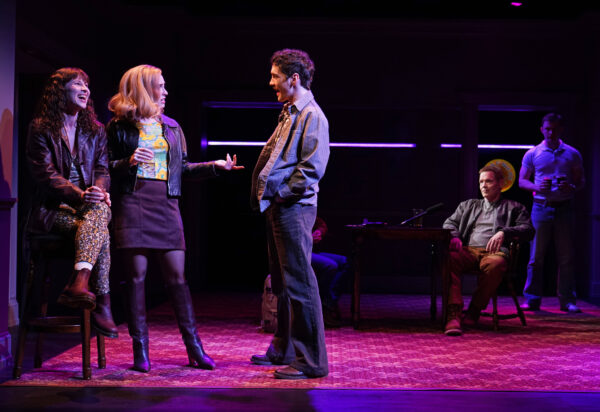
Doireann Mac Mahon, Annabelle Zasowski, Daniel Marconi, Michael Hayden, and Harrison Tipping in The Honey Trap (Photo: Carol Rosegg)
The history of the Troubles in Northern Ireland is a sticky subject to say the least. Leo McGann’s new play, The Honey Trap, focuses on the impact of that conflict on the British soldiers who were sent there. The result is a play with some implausible plot twists and an unfortunate flattening of complex subjects. Some of the most interesting elements are left to the fringe of the story being told.
In the present day, British solider Dave (Michael Hayden) has agreed to be interviewed by historian Emily (Molly Ranson) for an oral history project on the Troubles. He is there to speak about an incident that he was involved in in 1979 in Belfast. In flashbacks to 1979, we see twenty-something Dave (Daniel Marconi) and his mate Bobby (Harrison Tipping) out at a pub. They got picked up by some Irish girls, Lisa (Annabelle Zasowski) and Kirsty (Doireann Mac Mahon). In the end, Dave goes back to the barracks but Bobby goes home with the girls only to find out it was a “honey trap” by the IRA and Bobby is killed. Dave has never been able to move past this event and is hoping to find out who was responsible for the killing from Emily’s project.
In a ridiculous plot device, Dave gets a hold of Emily’s confidential interview tapes and tracks down the woman who he met that night (Samantha Mathis).
Emily says in the play, “I didn’t think it made any sense to build an oral history of a three-way-conflict that only spoke to two of the sides.” So, this is supposed to be a unique perspective into that third group of people, the British soldiers. But using Dave as our envoy on this journey is a challenge. He is boorish, bullying, manipulative, and honestly, super gross. So it’s really hard to be led by him into his morass of bad choices and watch him attempt his own form of “truth and reconciliation” which plays out as a sadistic, misogynistic revenge tale. He may have reasons to hate women, but the way he is presented made it impossible to care about him from the jump.
Dave and the IRA woman he hunts down are haunted by their past. They have been wounded by their experiences and no one has come out unscathed. The play attempts to show that there are little lies we tell the world to manage our own sanity. Dave feels complicit in what happened to Bobby but he spends a lot of the play deflecting that. Giving into the guilt would kill him. So, it is revenge against the IRA that fuels him. And in the retelling over and over, each time there is slighly more “truth” that comes out. But this nuance around lying to ourselves and others, gets muddled in this production. Director Matt Torney stages the bits of memory play too broadly. Hayden’s performance does not hold the duality of Dave’s anger and guilt in balance.
The playwright wants to focus on this “outsider” perspective on the conflict thinking these British soldiers were an underrepresented voice in what took place. And as I was watching, I realized for an American of my age and generation, something felt too familiar to me about this storytelling. That is the surprising thing about cross-cultural theatergoing. It can reveal more about your own biases. But if you grew up watching the aftermath of the Vietnam war and heard stories of young American men who ended up in a conflict they did not understand, the resonance of Dave and Bobby’s role is muted. We have been fed that narrative here for a long time.
And this is not on McGann, but it changed the heft the play for me. Though I appreciated McGann’s nod to Boston’s role in the conflict. For years, the funding for the IRA came from people in Boston and that does feel like a topic we have not really delved into as Americans. Dave’s conflict with Emily over her Irish-American identity was a fleeting bit of compelling stage tension as well.
This is all to say there are some big, knotty issues to untangle among the characters. Each of these dynamics could be be a play or 100. But this play picks a narrower path and we end up watching Dave stage his own personal skin-crawling honey trap which frustratingly did not illuminate much beyond his rage.
